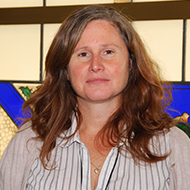
Julie Dugmore celebrated for her commitment to VN education.
Julie Dugmore, director of veterinary nursing at the Royal College of Veterinary Surgeons, has received an award for her dedication to improving the standards of veterinary nursing education worldwide.
The Bruce Vivash Jones Veterinary Nursing Award is part of the British Small Animal Veterinary Association's (BSAVA) awards, and is presented in recognition for outstanding contributions to the advancement of small animal veterinary nursing.
RCVS CEO Lizzie Lockett commented: “I am very proud to have Julie as my colleague and it is wonderful that her decades-long contribution to the veterinary nursing profession both in the UK and abroad has been recognised in this way.
"As her award nomination makes clear, Julie is an internationally-recognised expert on veterinary education standards who is often invited to speak at conferences and provide her expertise on this subject across Europe.”
In announcing Julie as the recipient of the award, the BSAVA cited her national and international work on improving veterinary nursing education standards, as well as her roles as Chair of the Accreditation Committee for Veterinary Nursing Education (ACOVENE), as a former Board Member of the Veterinary European Transnational Network for Nursing Education and Training (VETNNET).
The BSAVA also noted Julie's work with several Leonardo da Vinci Programme-funded projects, developing veterinary nurse training across the European Union.
Julie and her team have also carried out many projects to advance veterinary nursing education, including the introduction of a new Certificate in Advanced Veterinary Nursing, an improvement of the quality standards for veterinary nursing education and progressing the VN Futures project.
“Julie is always very modest about her achievements, so I am delighted that this award is an opportunity to showcase her hard work, which has helped make the UK a world-leader in veterinary nurse training, standards and best practice,” Lizzie continued.
Discussing her award, Julie said: “I would like to thank BSAVA for this special award. I am delighted and honoured to have been recognised by my peers and, along with my wonderful team, I will continue to do all I can to progress our profession.”
Image (C) RCVS



 The Federation of Independent Veterinary Practices (FIVP) has announced a third season of its podcast, Practice Matters.
The Federation of Independent Veterinary Practices (FIVP) has announced a third season of its podcast, Practice Matters.